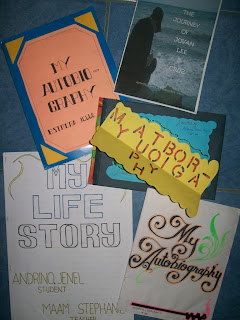
As part of the English programme, we asked all the junior students to write their own autobiography. It was a project which seemed to really capture their imagination and I was impressed (and I acknowledge mildly surprised) by the enthusiasm with which they set to work. With planning ahead a distinctly lacking skill here, I set the four week deadline with a degree of trepidation, expecting to spend the week after the deadline reminding them to get started; but no, the only ones not handed in on deadline day were those which the students had submitted early. I had offered that if they handed in a draft ahead of time, I would correct and help improve it, and many took me up on the offer (which rather added to my workload, but aside from that minor irritation I was very impressed!) The final copies, for the most part showed a huge amount of effort had gone in to both the writing and the presentation of their books, and I am delighted that they now all have a beautiful keepsake of their life so far.
Reading them I was touched by the openness and honesty with
which they wrote. I had suggested that to make their autobiographies interesting,
they should include thoughts, feelings and reflections: and they did. In most
cases, what they wrote was an honest and frank account of their ups and downs, theirs
successes and failures, their pleasure and pain, their loves and fears, their
joys and their sorrows ... and they were happy to share all of that with me.
 Much of what they wrote spoke clearly of the universality of
the experience of childhood and adolescence: lessons they loved and hated, games,
parties and excursions, the shifting parameters of relationships with parents,
the importance of friendships and the highs and lows of dating featured prominently
among their stories. Parts of what they wrote could have been written by any
teenager in the world.
Much of what they wrote spoke clearly of the universality of
the experience of childhood and adolescence: lessons they loved and hated, games,
parties and excursions, the shifting parameters of relationships with parents,
the importance of friendships and the highs and lows of dating featured prominently
among their stories. Parts of what they wrote could have been written by any
teenager in the world.  But amidst the mundane stories of day-to-day teenage life,
there were plenty of parts that were hard to read, because they also wrote with
searing honesty of the struggles and challenges of living with poverty: of not
seeing parents who were forced to work away, of dropping out of school when
there was no money for the transport to get there, of experiencing the bottom
dropping out of their world when a parent lost a job and there was no safety
net to catch them, of watching their parents in tears because of financial
problems, of feeling hungry and not being able to eat.
But amidst the mundane stories of day-to-day teenage life,
there were plenty of parts that were hard to read, because they also wrote with
searing honesty of the struggles and challenges of living with poverty: of not
seeing parents who were forced to work away, of dropping out of school when
there was no money for the transport to get there, of experiencing the bottom
dropping out of their world when a parent lost a job and there was no safety
net to catch them, of watching their parents in tears because of financial
problems, of feeling hungry and not being able to eat.
They may just be like any other teenagers, but some of them have
experienced things no one of any age should ever have to, and I feel extremely
privileged to have had such a personal insight into their lives. Thank you to
all the juniors.


No comments:
Post a Comment